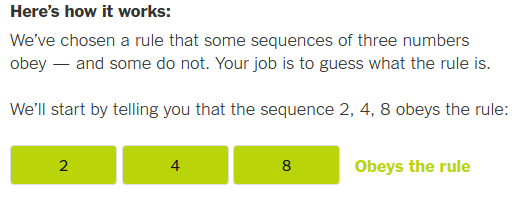Summary: To stay on top of your personal development, try learning new things like a programming language, an instrument, or exposure to a new field (e.g. biology or accounting). Exposure to new ideas helps you avoid confirmation bias and increase you willingness to explore your analysis further.
As an analyst, it’s easy to think you’re hot stuff. People come to you for answers and you can navigate archaic databases and call forth information from the back of your mind. But it’s important to maintain a beginner’s mind.
- Beginners have no preconceptions and are not held back by what is considered to be the norm.
- Beginners are not embarrassed to ask “dumb” questions.
- Beginners are willing to try new things and draw connections from other things they know about.
An eye opening moment for me was when I tried this puzzle from the New York Times. Visit the site to try it for yourself.
Keeping a beginner’s mind (by constantly exposing yourself to new ideas) can help you avoid costly mistakes and find better solutions. So here are a few areas that you can
Learn a programming language
Most people with an analyst title I know of really only know how to work Excel and SQL and that’s it. While SQL is an important language to know, there is a lot left on the table.
For those who think Excel is enough, I would suggest reading about some of the potential consequences of relying on Excel for analysis.
- Starting Out: Learn Python for an easy introduction to programming.
- Data Mining: Learn R or Python.
- Enterprise: Learn Java for exposure to enterprise level code.
- Speed: Learn C to see what it takes to write code that is “closer to the metal“.
All of the mental exercise you gain from trying a programming language can help you automate the boring stuff out of your job or create pipelines to get data in and get reports out.
Pick a language and just try doing some tutorials for a few months and see what sticks.
Learn Something Outside of your Comfort Zone
Most modern inventions are not brand new ideas. They are incremental advances but occasionally a new idea shakes up the industry. Typically this advance combines two or more concepts from different fields.
Think about neural networks (biology), simulated annealing (physics), and genetic algorithms (genetics). They are the result of combining computer science and a phenomenon from nature.
There is always something to learn from someone else. Fields like accounting can show you different ways of looking at your data (for example the differences between cost accounting and financial accounting).
If you need some hand holding, try taking a class at your local community college (find your nearest community college). It’s the best return on your investment you could ask for!
Learn to Memorize and Practice Mental Math
A big part of being an analyst is being able to recall information at the drop of a hat. One of the key aspects to memorization is being able to build associations.
If you’re interested in learning the system behind an impeccable memory, take a look at The Memory Book by Lorayne and Lucas.
As part of learning to memorize, you should know your addition, multiplication, and division down pat. How often does an analyst do some mental math in a given day? Whenever you’re checking a total against some baseline you’re eyeballing the difference or the percentage.
Yet after we graduate, we stop practicing math! I would seriously suggest installing a notecard tool to help you practice if you make mistakes or are slow to recognize the patterns in numbers.
Learn an instrument
Getting outside of your comfort zone and trying something new can help you reason about things differently. By learning an instrument you exercise a different part of your brain.
Get lost / Take different routes
Spatial-reasoning is an essential skill for humans and we use it everyday. However, as an analyst, I’m certain that you have found the most efficient route to get to and from work just like you’ve realized the most efficient way to hang your toilet paper.

Consider going to a (safe) part of town that you have never been to and just explore and then try to find your way back. Worst case you can turn on your GPS and get back home.
On days when you need to be creative, consider taking a new route to work.
Join a group
Perhaps the best thing you could do is join a meetup and discuss new ideas with peers and superiors alike. My favorite thing about the Milwaukee Big Data meetup is the vast collection of experiences gathered in one room.
Join in on a conversation and you’ll likely learn something new either about your interests or about yourself!
Bottom Line: Try new things that are beyond analysis and you can connect new pathways in your brain which can help you in your analytical work.
